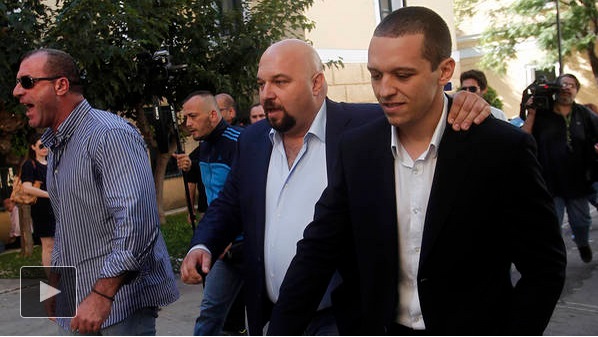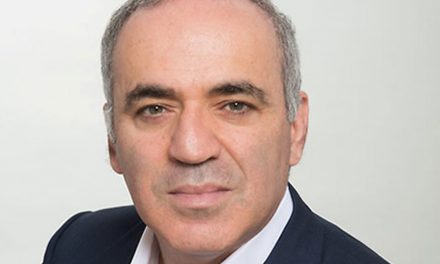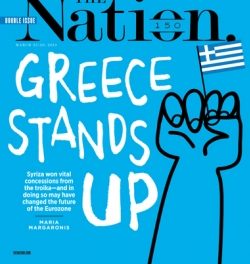By LIZ ALDERMAN, The New York Times
NIKAIA, Greece — For over a year, 30 Kaisareias Street bustled with activity. Burly, black-clad members of the neo-fascist Golden Dawn party converted part of the nondescript white building into a headquarters, holding frequent meetings and fanning out for military-style neighborhood patrols armed with batons and heavy poles wrapped in the Greek flag.
Then, last week, the group disappeared overnight. A regular in the office, Giorgos Roupakias, was accused of killing an anti-fascist activist in a crime that shocked the nation, and the government began an effort to “eradicate” the group, as Prime Minister Antonis Samaras put it.
But already, serious questions have been raised about the planning and effectiveness of the crackdown, and whether it may actually boomerang against the government and end up generating sympathy for Golden Dawn, one of Europe’s most violent far-right groups.
“If it is not handled properly, you could get a kind of a bounce back of Golden Dawn,” said George Katrougalos, a constitutional law professor at the Democritus University of Thrace. “If they appear to be victims of the establishment, that may broaden their appeal.”
Questions are already being raised about the legality, even constitutionality, of the government’s methods.
On Wednesday, in a surprise decision, a magistrate ordered three prominent Golden Dawn lawmakers, among 35 people associated with the party who were arrested in a sweep last Saturday, to be released pending trial. After more than 17 hours of testimony, one of the men, the party’s spokesman, Ilias Kasidiaris, strode from the court, called reporters “bums” and pushed photographers out of his way.
However, a fourth Golden Dawn lawmaker, Yannis Lagos, was remanded to custody after the judicial authorities deemed that evidence linking him to criminal activities — including murder, attempted murder and blackmail — was strong.
The legal wrangling pointed to the rising conviction of the government and many others here that Golden Dawn has been run less as a political party than as a mafia. But it also underlined concerns that the government’s case might be riddled with legal holes and procedural missteps in the investigation. Golden Dawn’s supporters say the government is basing its case against party members in large part on wiretaps that lacked the required judicial approval.
Mr. Samaras has made it clear that he sees no place for Golden Dawn in the Greek political system. “We must do it within the context of our democratic Constitution,” he said in a speech in New York this week. “But we have to go all the way and do whatever it takes.”
Doing so will not be easy. Because the government cannot ban political parties, it is trying to undermine the group by dismantling its leadership and cutting its financing. Prosecutors are charging members with participating in a criminal organization, a move that would effectively outlaw the group.
In court testimony, the Golden Dawn spokesman, Mr. Kasidiaris, said his group was the victim of a politically motivated persecution aimed at discrediting the party before local elections next spring. He and the others denied the government’s accusations.
Golden Dawn’s popularity has slipped since Mr. Roupakias admitted to the killing of the activist, Pavlos Fyssas, a Greek rapper whose lyrics inveighed against rightist extremism. But questions have swirled around why the government is only now pursuing an organization whose violence and Nazi ideology have been well documented.
Included in the 31 charges are cases that have been pending for years, involving murder, extortion and money laundering — none of which were previously pursued by Mr. Samaras’s government. The Greek ombudsman cited nearly 300 cases of recent racist violence involving Golden Dawn members that also received no judicial attention.
“It is obvious that there was an inertia toward Golden Dawn by the state and other authorities until now,” Mr. Katrougalos, the law professor, said.
In the working-class neighborhood of Keratsini, where the killing took place, anti-fascist graffiti was scrawled on buildings near banners calling for rallies against Golden Dawn. Rap music thumped from cars, and groups of young people packed cafes on Tsaldari Street, where Mr. Fyssas was stabbed.
On the spot where he died, a makeshift shrine was erected with candles, red roses and a white cross. An anarchist symbol — the letter “A” enclosed in a circle — was spray painted on a doorway next to several scrawled homages, including one that read: “Safe travels my brother. Vengeance has already begun.”
At the Ouzo cafe in Nikaia, near the group’s shuttered offices, people were elated that Golden Dawn had scattered. “It’s already better,” said Giorgos, 61, a retiree who would give only his first name. “These people were like thugs, with their flags and poles, wearing their black shirts and army pants and boots. If you saw them up close, you’d be scared.”
He added that Mr. Roupakias was known in the neighborhood for attending Golden Dawn meetings, and had run the cafe in the group’s offices.
Many here were angered that Golden Dawn had come to the Keratsini neighborhood from Nikaia. “This is a working-class area that resisted the Nazis, who rounded up people and shot them,” said another retiree, Stavros, 56, as he sipped coffee. “The mass grave is still there. So it’s a disgrace that this neighborhood was then occupied by fascists.”
But no one thought Golden Dawn or the grievances that vaulted it to power would be easily overcome.
“They cut the head of Golden Dawn,” said Artemis Sarafoglou, 21, a resident who frequently encountered Golden Dawn members patrolling the streets. “But this may be like the Hydra, where something new can grow in its place.” He said that several of his friends had voted for Golden Dawn, helping it win 18 seats in Parliament last year, and that their support for the group had not wavered.
“The reasons why Golden Dawn came to power have not been erased,” Mr. Sarafoglou said, looking at a party banner that still fluttered from a balcony. “It’s truly possible that they could rise again.”
In Keratsini, Eleni Batziopoulou, 24, a philosophy student, said that she and her friends had no real hope that Golden Dawn would become truly enfeebled. Instead, the clampdown raised a more profound question.
“Is this the end of Golden Dawn, or is it really just the beginning?” she asked. “I want to believe it’s the end, because I want to have hope in the future. But if it’s not, then it’s the start of a wave of trouble.”



















